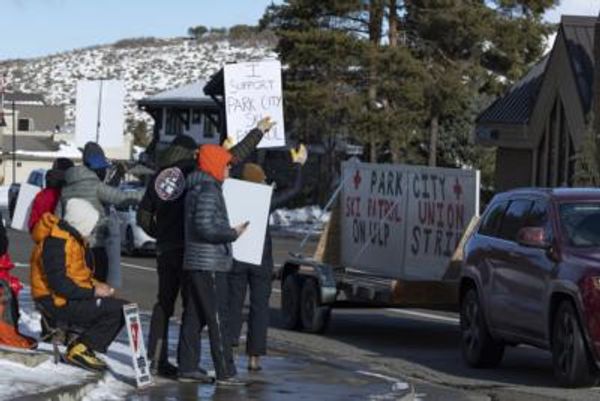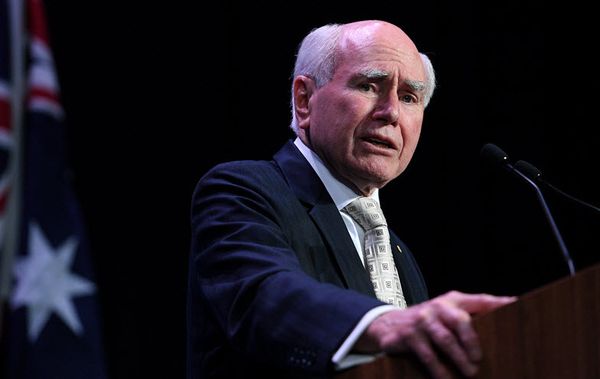
Nooooooo! Not Pinstripe Panda Dear Father! On the weekend, Senator Kim Carr announced that, all things considered, he would not be nominating for Labor’s Victorian Senate list after consultation with his family and given considerations of his health. This was taken as the real reason by absolutely no one, given the widespread knowledge that Carr’s Victorian Socialist Left faction had crumbled beneath him, and that the national Left — i.e. Albanese — was gunning for him.
That is a seismic shift. With Carr’s departure, there departs not only a veteran of the huge faction wars of the early 1990s, but the last figure in the parliamentary party with any clout — and courage against scorn and lazy thinking — who was willing to stand up for a statist industry and economic policy of active intervention, state-enterprise leadership, the rebuilding of Australian manufacturing, and an orientation to import replacement.
The attack on Pinstripe Panda Dear Father has both philosophical and personal differences, although many commentators are apt to play down the former, and see it as a product of the widely known personal dislike between Carr and Albanese, and Carr’s decision in the 2013 leadership contest to back Zinger Bill against DJ Albo.
It was, but Carr’s reason for backing Shorten, from the Right, over a fellow leftist is that the core of the Victorian Socialist Left doesn’t regard Albanese or the national Left, as left in any sense — i.e. the political-economic — that they would regard as important. There is personal dislike between Albanese and Carr on a range of things. Though Albanese was from modest circumstances, he quickly joined the groovalicious young Labor-student politics swirl when he made it to uni. Carr worked as an outer-suburban high school teacher while working his way up the faction (though his birth was more spectacular — on the side of a storm-tossed mountain in Korea, when Kim Il-sung pierced the side of a she-bear).
Thus where the Socialist Left (which refers to the Victorian Left only, here) under Carr want a genuinely nationalist social democratic policy, they believe that the national Left has abandoned any real resistance to global neoliberalism and has simply accepted that we will be a huge quarry/farm that ships bits of the continent north, and we’ll sell each other $7 coffees with the proceeds. They believe that those in the national Left who are actually leftish simply focus on redistribution of the national surplus to a very limited degree, and that many are solely focused on social-cultural issues.
In turn, that part of the Left who have been trained in conventional (i.e. ideological, university-level) economics see Carr’s position as crazy, discredited and against the revealed wisdom of neoclassical economics and “comparative advantage” trade theory. In this approach, $5 billion of GDP can be composed of either Australian-made cars and wind turbines, or it can be the activities of wedding planners — it doesn’t really matter.
Comparative advantage says that if we produce iron ore and you produce insulin, we don’t need to make any insulin of our own because the global system is now so vast that it will never get interrupted by something like, say, a pandemic. There is, among the worst of them, a dissolutionist trend (which they would deny), a lack of concern about how a nation is actually composed, a fey internationalism — but one drained of any global revolutionary fervour. They’d register the country in the Cayman Islands as a holding company if they could.
This split goes back to the early 1990s, when a then-unified socialist Left was split in two (or more) by the decision of socialist Left leader Brian Howe to support the Hawke — and then Keating — government’s further and comprehensive attack on the tariff and protection systems, and on a whole raft of statist industry measures. This was in exchange for a big “social deal” of an extension of Medicare, unemployment and training initiatives, a “better cities” program and so on. Following that deal, a section of the SL jumped out and formed the “Pledge” faction, to carry forward the idea of, well, actual socialism in those days. They then did some deals with those sections of the right that were still sufficiently economically nationalist to have some affinity, though it was more a sergeant-major’s wedding than anything.
But that laid down the productionist/distributionist split on the Left. Barely needless to say is that most of the Labor Right is distributionist too — when they are reformist at all. When not imposing de facto austerity, they communicate to the public the sense that they regard the productive economy as a “black box” from which money can be extracted, without Labor having to take on the core question of what the inner workings of the black box are.
This habit of mind becomes a habit of messaging, as when Chris Bowen — opposition treasurer in 2016, now living incognito in Duluth under the witness protection program — introduced the franking credits clawback as the leading edge of the Labor campaign. The clawback wasn’t linked to any concrete outcome — regain franking credits money to implement the full Gonski program or somesuch — and there wasn’t a mention of any policy regarding how such money might be reinvested in the productive economy. So even though the only actual losers would be well-heeled investors, the redistributionist-only character of the policy simply emphasised the old split: Labor were good at spending your money, the Libs better on how we make it.
Carr’s departure is thus a mortal wound for Labor, for any of us who believe that a globalisationist, neoliberal, neoclassical approach to economics is a disastrous error for any social democratic party, a mistake about the nature of the world, and a policy setting which eventually obliges Labor to be the whip hand imposing on its own class base disciplinary austerity programs on behalf of capital — and which creates a vacuum which the Right will fill with economic populism.
Were there others coming up bearing the standard, Carr’s departure would be just about prising Panda Father’s thumbs loose from the bamboo. But Linda White, the ASU leader replacing Carr in a dizzyingly complex factional tradeoff, won’t have anything like that to offer. Nor would have inner-city lawyer Josh Bornstein, though he would have provided a forensic acuity to match Carr’s famous performances in estimates, something I suspect White will not offer (presented as “new blood”, she is 63 to Carr’s 66. The possibility that she is Carr in a bad wig has not been ruled out, as Panda Father’s last, wily act of improbable survival).
Alas Bornstein, a frequent Twitter moraliser, was hung out to dry by The Australian on the basis of a surprisingly large number of tweets deemed a bit “off” in gender matters, and an endlessly repeated photo of him in pink-framed glasses and Badly Drawn Boy-style beanie, worn at a jaunty angle, and that was really the end of him. Who could have done all that work, gathering together such a trove?
The fact that, at the core of Labor’s “Left”, there is a split about the basic purpose an economy plays in national life, and what its form should be, shows you how rapidly the left-right frame has been transformed over the past decade or so, and how active the recombination process is. God knows the “Shorts” faction are hardly “nationalise the widget industry” types, but in a final tilt at political survival, Carr had been making alliances with various elements over there, in particular the late Kimberley Kitching. To no avail. His program is a victim, in part, of Labor’s insularity. It’s not as if there was much effort, by the SL, to create a public movement over a left nationalist economy. That hasn’t been done in the factions, but if it had, and had been aimed at Labor’s Right, it would have met with enthusiasm, from many of the people Labor endlessly says it is trying to “win back”.
Now instead a centre-right economist such as Andrew Charlton will march into Parliament as member for Parramatta, stepping on the heads of furious local Labor members, a man who looks like a Grenadier Guards officer shot by his own men. When he moves there, the people of Parramatta won’t know whether they’re getting a new MP or Viceroy.
Still, it’s an ill wind that turns no turbines. The party that could benefit from the last powerful nationalist social democrat leaving Labor is the Greens who, casting neoliberal orthodoxy away, could champion not merely a “green new deal” but an “Aussie industry green new deal”. With Adam Bandt’s leadership having turned the party back to a left political-economic program, the simple idea of a massive employment-good jobs revolution based on the MMT-funded replacement of the whole “national plant” could really start to resonate in places where people feel abandoned by Labor.
That, rather than direct conservation-environment politics, could be the way in which the Greens can break out of the “knowledge class” barrier across the country, especially if they could switch off their progressivist anti-nationalism long enough to give it some patriotic branding of a daggy national form — Ozzie the Aussie Bright Spark cartoon character or some such nonsense.
The move would create a platform for the Greens’ “Syriza moment“, in which a wider global economic crisis — which may well occur in the next government’s term — would discredit both major parties, and leave the Greens as the voice of common sense. Should that occur, one hopes they will find a shady bamboo grove for Pinstripe Panda Dear Father to continue his passion of gnawing away at things — a man who has served his cause and nation greatly in a sometimes lonely struggle and against great odds, and who will, in time, be seen for it as not only prescient but as a patriot.










